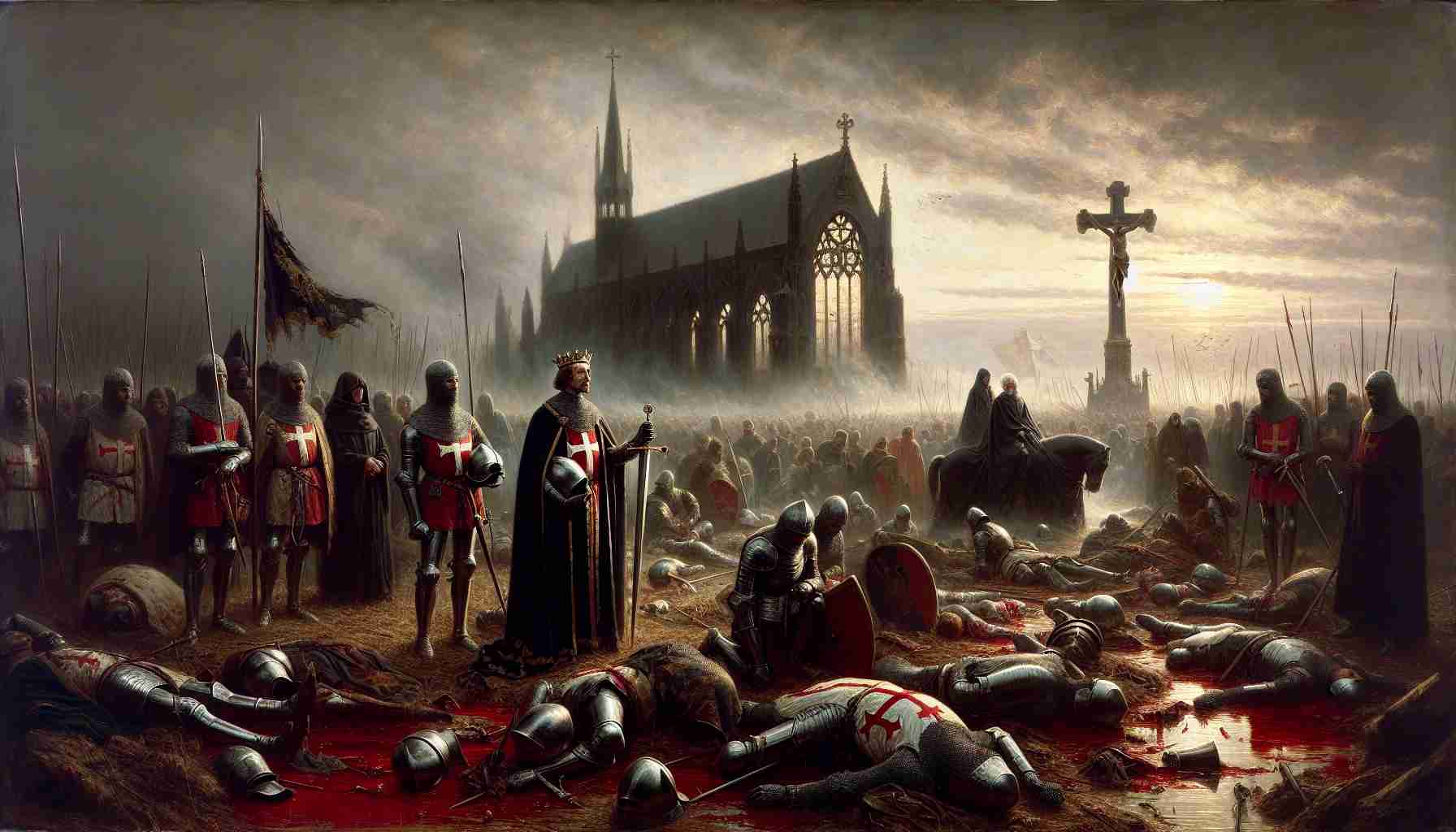

Smoke drifted across the plain like a funeral shroud, the embers of battle still glowing in the tall summer grass. Shrewsbury’s fields, once green beneath the July sun, were now painted in the red of war. Broken armor lay scattered among the dead—cloven helms, splintered shields, and the lifeless bodies of men who had sung psalms at dawn and perished before dusk.
King Henry IV dismounted slowly, his chainmail rustling softly, each link heavy with the weight of victory and mortality. His boots pressed into the blood-soaked earth as he walked toward the chapel raised hastily by his priests. He paused before the crucifix, the wooden figure of Christ blackened lightly by soot from the campfires still burning behind the lines. The king bowed his head and rested his gloved hand upon the sword at his side.
“Some trust in chariots,” he murmured, voice graveled with dust and prayer, “and some in horses, but we will remember the name of the Lord our God.”
Psalm 20:7. The verse had whispered through his dreams the night before the battle, rising among his fears like morning light through fog. Faith had guided his hand where reason failed. Now, in the silence after slaughter, he wondered at the strange justice of God.
The rebel, Henry Percy—Hotspur, bold-hearted and proud—had led a force swollen with northern bitterness. They had ridden for the crown, many driven as much by their own ambition as by grievances kept alive through years of border war and unpaid debts. The Percys had once elevated Henry Bolingbroke to power. Now they sought his ruin.
The king had moved swiftly, intercepting the rebels near Shrewsbury. Priests in his retinue had knelt day and night, praying for victory. Through the clash of blades, Henry had not seen triumph as certain, only possible—resting solely in the Lord’s mercy.
A page approached, breathless and pale. “Sire, they found Hotspur. Fallen. A blow to the face. He bled before he knew he was dying.”
Henry closed his eyes. Hotspur’s death had come like many others that day—quick, undeserved, and without warning. But in his demise, rebellion broke.
“To the chapel,” the king ordered. “We give our thanks.”
The makeshift sanctuary was little more than canvas walls and rough benches. Yet within it, the sound of chants rose like incense to Heaven—Sanctus, sanctus, sanctus. Henry knelt before the altar, flanked by his knights. More than gratitude stirred within him. He felt the weight of destiny tightening like the cinch of a breastplate.
He had won the field, but at what cost? Thousands lay slain—English sons killed by English blades. The kingdom was not healed, only spared from shattering.
Yet within the ache of bloodshed, there emerged clarity. England’s crown, so often seized by might, now bore the unmistakable mark of God's provision. The Church preached it fiercely—God had preserved the ordained line. The triumph was not only his, they said, but Christ’s. The banner of the lion now stood again beneath the cross.
In the days to come, preachers would recount Henry’s righteousness. They would speak of how he’d marched with scripture upon his tongue, of how Hotspur’s fall was prefigured by divine will. Some whispered the king had seen a vision before battle: a sword of flame descending from Heaven, its edge turned against the treacherous. Whether true or not, such stories hollowed their mark in the hearts of men.
Beneath the gray cathedrals of London, sermons would echo—God ordains kings, and those who rise against them rise against His plan.
Yet not all believed. Some chroniclers noted the confusion in the ranks before dawn, the hesitance of Percy’s men, the accidental regroupings that favored Henry. They questioned whether holiness wore the seal of victory or whether history simply crowned the winner. These voices were soft and soon fallen silent beneath the triumphal tones of court and clergy.
Still, in the privacy of his soul, Henry remembered. Remembered the fear as spears closed in. The cries of the wounded. The moment when an arrow nearly found Prince Hal, his own son, grazed across the brow by death itself. Faith had steadied him, not blotted out the terror. That was the truth the bells did not ring.
On the battlefield weeks later, pilgrims began to gather. They knelt at the place where Hotspur had fallen, and later, at the place where Henry had wept. One such spot, legend claimed, was where the king had muttered a second psalm—not of triumph, but contrition: “Create in me a clean heart, O God” (Psalm 51:10).
Years passed, and the wounds of rebellion scarred into England’s memory. But the Battle of Shrewsbury stood as a hinge of history—a place where faith lent strength to sword, and belief lifted flesh into action. Whether it was divine favor or the momentum of kingship, few could say with certainty. But one truth remained:
Henry had trusted not in chariots. He had trusted in the name of the Lord his God.
And on that day, the Lord delivered victory.